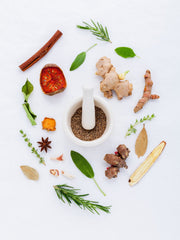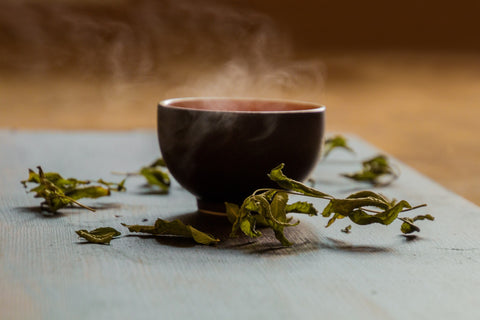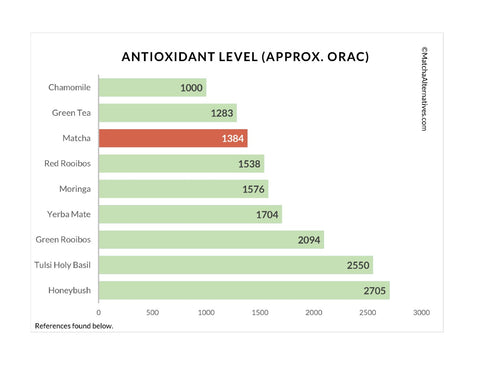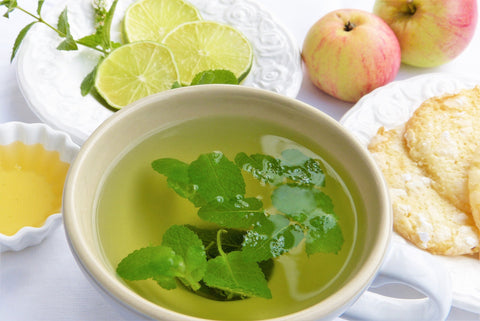In this post you’re going to learn what the best teas are for the Ketogenic and Paleo diets. I’ll cover:
- Briefly, what these two diets are
- Types of tea allowed on Keto and Paleo
- The best teas for boosting energy
- My personal favorite teas for these diets
So if you want to feel confident about which teas you can and can’t drink on the Paleo and Ketogenic diets, you’ve come to the right place!
What is the Ketogenic or “Keto” Diet?
 The keto diet is a high-fat, low-carb diet which trains the body to burn fat efficiently, while supplying the brian with ketone energy (‘achieving ketosis’). Popular for its weight-loss effects and numerous health benefits, keto dieters find themselves avoiding grains, processed foods, sweets, alcohol, fruit (except berries), tubers and legumes. Despite these restrictions, some sources allow diet sodas and low-carb alcohol, which “toe” the health line.
The keto diet is a high-fat, low-carb diet which trains the body to burn fat efficiently, while supplying the brian with ketone energy (‘achieving ketosis’). Popular for its weight-loss effects and numerous health benefits, keto dieters find themselves avoiding grains, processed foods, sweets, alcohol, fruit (except berries), tubers and legumes. Despite these restrictions, some sources allow diet sodas and low-carb alcohol, which “toe” the health line.
Keto has several variations, but only two have clinical support for their effectiveness. Standard keto and high protein keto have been tested, while cyclical keto and targeted keto have not been adequately researched regarding safety or effectiveness. (Cyclical keto is involves 5-6 days of the normal keto diet, with 1-2 days a week as high-carb days, while targeted keto involves eating ~25g of carbs before working out, but otherwise following the standard keto diet)
Keto has been shown to be more effective for weight-loss than following a low-fat or Mediterranean diet. However, the safety of keto long-term is debatable, and can cause nutritional deficiencies and decrease athletic performance due to the higher acid pH occurring during ketosis.
Can I drink tea on the Keto diet?
Simplistically speaking, any plain tea, or unsweetened tea blend is keto friendly, because tea has zero carbohydrates.
Avoid teas with fruit in them, added sweeteners, and dessert teas - these usually contain non-keto ingredients. By adding in keto-friendly, alkalizing teas, you can boost the effects of ketosis, support alkalinity, reduce inflammation and increase fat loss.

Some of the best teas for the Keto diet
These are my favorite keto-friendly tea options, as they are all zero carb but also full of antioxidants (see chart below for full comparison):
'True' Tea
Any tea from the Camellia sinensis tea plant is allowed under the Keto diet. This includes black, white, oolong, puerh, green, matcha and purple.
One of the best, though, is purple tea: made using the green tea methods, which retain antioxidants, its tea leaves have additional antioxidants that you won't find in green tea. The flavor is well rounded, subtle and sweet. Due to medium caffeine content, this tea is a mild acid, and healthier compared to other acidic beverages. You can learn more about purple tea here.
Moringa powder
An alkalizing, energizing herbal, this is a keto-compliant protein-rich tea. Moringa also helps lower blood glucose levels, making it a helpful food-supplement to those using Keto to address health problems such as diabetes*. Moringa has more antioxidants than matcha, as well as many vitamins and nutrients - so many that it is often used to treat malnutrition. Read an intro to moringa here.
Honeybush
Avoiding sugar can make your palate more sensitive to sweet-tasting things. This has a sweet, lightly sour flavor and is perfect for an after-dinner, alkalizing, caffeine-free drink.
Rooibos
Earthy, nutty, vanilla-esq, and floral, this tea has a deliciously complex flavor profile and is caffeine free, alkalizing, energizing, yet can be consumed in the evening without harming your sleep (and some studies have shown it actually improves quality of sleep).
Read my comparison of rooibos vs honeybush here if you're curious!
Yerba Mate
This tea is often overlooked, but unfairly! Unlike coffee, Yerba is a weak acid, meaning it is gentler on the pH of the body and is easily neutralized. With a caffeine-content nearly equal to coffee (~85 Mg/8 Fl Oz, while a cup of coffee has ~95Mg/8 Fl Oz caffeine for comparison), mate’s nutrient profile and weight-loss properties make it a great addition to the keto diet. You can read my introduction to mate here.

What is the Paleolithic or “Paleo” Diet?
The Paleo diet is inspired by what early humans ate prior to the rise of agriculture. Research differs, with some experts claiming our ancestors ate mostly meat, while others suggest they were closer to vegetarian.
Regardless, the Paleo diet focuses on healthy, whole foods: meats, animal products (eggs and honey), vegetables, and raw nuts and seeds. They don’t eat dairy, sugar, processed foods, potatoes, grains, or salt. Benefits of Paleo seem to reverse nutrition-related chronic disease, like Type-II Diabetes. The Paleo movement arose from the belief that the Western diet is a cause of chronic disease, and by cutting out processed foods, trans fats, and sugar, a restoration of health could be achieved.
Is Tea Allowed on a Paleo Diet?
Strictly speaking, coffee and most caffeinated beverages are off the menu. So where does that leave us with tea (and that morning zing we all crave)?
Well, I have good news: Tea leaves from the Camellia sinensis tea plant are Paleo-friendly, despite their caffeine-content. There’s evidence that the first tea consumed was during the Paleolithic era! All ‘true’ teas come from this plant, such as black, white, oolong, puerh, green and purple tea.
There are many herbal teas that also fit the bill, as these have been consumed for millennia with minimal processing.
What are the best Paleo-Friendly Teas for energy?
Because coffee is generally not allowed on paleo, you’re probably looking for a caffeine replacement (despite the diet’s understandable claims that the diet itself will improve energy). Here are some specifically energizing teas that are allowed on a paleo diet. Some of them contain caffeine, and some of them are adaptogenic teas, which means they energize without caffeine.
Green Tea
From the Camellia sinensis tea bush, green tea is caffeinated and on average has around 30mg vs coffee's ~95mg, so is useful if you are sensitive to caffeine or would like a less intense energy burst. Due to interaction with other antioxidants in green tea, the caffeine is processed by the body differently, giving a sustained lift in energy with improved ability to concentrate. Learn more about all the cool things green tea does here.
Moringa
Caffeine free, energizing and moderates stress effects! This tea can come in either leaf or powdered form, and both are allowed in the paleo diet. Moringa is also a complete protein (an exceptionally rare thing in the plant world). I’ve written a lot more about moringa here if you want to learn more!
Yerba Mate
With nearly as much caffeine as coffee (~85mg vs coffee’s ~95mg), and nutrient-rich, Yerba Mate is a tasty coffee alternative. If you miss the roasted coffee flavor, try roasted Mate as a substitute. If you’ve never heard of mate before, read my introduction to it here.
Rooibos
A delicious, energizing alternative to caffeinated teas. It is naturally decaf and packed full of antioxidants. For loads more information about rooibos, my comparison of rooibos vs honeybush is a good starting point!
Tulsi Holy Basil
This incomparable herb is also energizing. However, part of its magic is that while it energizes, it also calms and centers you, helping to produce a relaxed alertness with a subtle improvement in endurance. I’ve written an introduction to it here.

Some of My Favorite Keto- and Paleo-Friendly Teas
In general, when choosing a tea for the keto or paleo diets, make sure it doesn’t have any flavorings or artificial sweeteners/sugar.
Happily, Matcha Alternative’s massive line of pure teas are all allowable on both Paleo and Keto, with the exception of the decaf Sencha (as Paleo doesn’t allow for mechanically decaffeinated teas).
Here are some of my pure and blended favorites from Matcha Alternatives’ collections:
|
Tea Name |
Allowed on the Keto Diet? |
Allowed on the Paleo Diet? |
|
Yes |
Yes |
|
|
No, due to fruit flavorings |
Yes |
|
|
Superior Organic Moringa Tea Powder |
Yes |
Yes |
|
Yes |
Yes |
|
|
Yes |
Yes |
|
|
No, due to the lemon peel |
Yes |
|
|
Yes |
Yes |
|
|
Yes |
Yes |

A Note From The Herbalist...
I hope you enjoy these suggestions! Diets are often hard, and having a treat that isn’t a ‘cheat’ food is a wonderful thing. I especially love that moringa seems to find a place to fit in almost any diet, and beyond drinking it, you can add it to your recipes to increase the protein content.
Regardless of which diet you prefer, I hope you give some of these teas a try - they are absolutely delicious.
|
If you want to dig deeper on different types of tea, read our
You may also like my piece
|
Explore our Posts & Teas
Disclaimer
All of the information regarding the herbs, botanicals, minerals, vitamins, etc., is information drawn from traditional use data or academic research and should be regarded as such. If you, the reader, has a health or medical concern, please consult your healthcare professional. The information found here is not meant to diagnose, treat, prescribe or cure and has not been evaluated by the FDA. This information is for educational purposes only.
Keto and Paleo Tea References and Further Reading
https://paleoleap.com/paleo-101/
https://www.precisionnutrition.com/paleo-diet
https://nunm.edu/2019/04/paleo-diet/
https://www.multicare.org/news/dietitian-weighs-pros-cons-paleo-diet/
https://www.sciencedirect.com/science/article/pii/S2352618117301361
https://blogs.scientificamerican.com/guest-blog/human-ancestors-were-nearly-all-vegetarians/
https://blog.kulikulifoods.com/2018/02/05/can-you-include-moringa-trendy-diets/
https://paleoporn.com/q/is-rooibos-paleo/
https://www.organicmate.net/yerba-acidic-alkaline/
https://paleoleap.com/paleo-caffeine/
https://paleoleap.com/chocolate-coffee-alcohol/
https://www.healthline.com/nutrition/ketogenic-diet-101#foods-to-avoid
https://www.dietdoctor.com/low-carb/keto/drinks
https://perfectketo.com/rooibos-tea-benefits/
https://onlinelibrary.wiley.com/doi/full/10.1111/j.1753-0407.2011.00173.x
Kushwaha, S., Chawla, P. & Kochhar, A. Effect of supplementation of drumstick (Moringa oleifera) and amaranth (Amaranthus tricolor) leaves powder on antioxidant profile and oxidative status among postmenopausal women. J Food Sci Technol 51, 3464–3469 (2014). https://doi.org/10.1007/s13197-012-0859-9
https://www.healthline.com/nutrition/6-benefits-of-moringa-oleifera#section3
https://paleofoundation.com/paleo-certification-standards/


